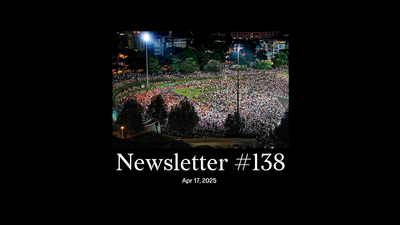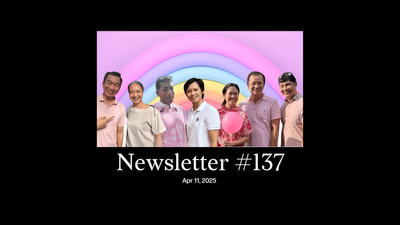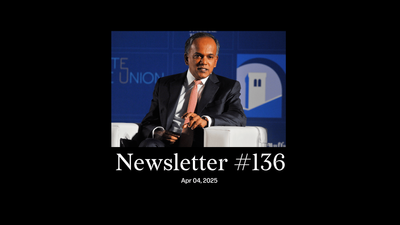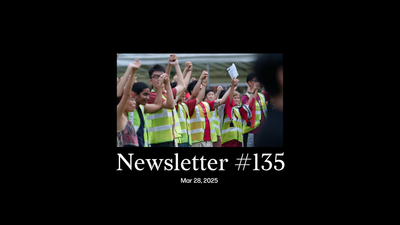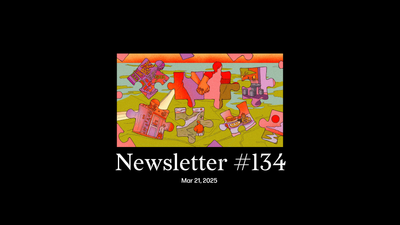Dear reader,
First, a reminder: Jom’s first print issue is now on sale for S$36, which includes domestic shipping. Some 300 have been snapped up, so get yours now. We’ll start shipping them at the end of November. Jom’s Supporters and Patrons are entitled to a copy with your subscription—we’ll reach out soon for your address—but do get more for your friends. I hope they make for good Christmas gifts.
Today, we honour a Jomrade who passed away this past July: Adrian Tan, lawyer and author of The Teenage Textbook (1988) and The Teenage Workbook (1989). Adrian and I had known each other superficially for several years before Jom was founded.
We referred to him twice in our work: first, in Faris’s blurb about the opium wars, itself a response to the never-ending SG vs Richard Branson debate over the death penalty; and then with the decision by ACS, his alma mater, to move its campus from Barker Road, near some of Singapore’s biggest bungalows, to Tengah, a public housing heartland.
In both we wryly criticised positions Adrian, in his latter-day rebirth as “King of Singapore” on LinkedIn, had taken. That sparked private conversations between us on everything from cannabis and Singapore’s drug laws to estate upgrading in the heartlands. (Aside: I’ve heard that a compilation of the King’s decrees will soon be published.)
At some point Adrian slipped this into our message stream: “PS I subscribed to Jom. It’s got good writing, which is something I appreciate.” It made me happy, mostly because it was clear that Jom disagreed with him on issues, certainly his ultra-nationalistic retorts to Branson. We’ve always wanted this to be a space where different viewpoints—toxic and harmful ones aside—can be aired. It’s sad that we’ll now never get to hear or see Adrian engaging as part of this Jommunity.
Still, his legal and literary legacies will continue to inspire, and invite criticism, and we could think of no one better to engage in a retrospective of the Teenage books than Gwee Li Sui. Gwee is a poet, a graphic artist, a literary critic, and a translator, who, along with Adrian, fronted the Singapore Writers Festival’s Closing Debate from 2009 to 2018.
Gwee’s piece, “Adrian Tan vs The Textbook”, is impressive in its range. He talks about the commercial success of the young novelist (over 87,500 copies sold across the two, an incredible feat for works about Singapore); how the literary scene has changed since the late 1980s; Adrian’s choice of law, a “...singular pursuit so energising that it would not feel like work...lawyering was that pursuit because of his love for language and arguing”; and the “split homage” following the passing of Adrian, the lawyer-writer. (I enjoyed the tribute by Indranee Rajah, minister and his former colleague.)
Most special, perhaps, is Gwee’s close reading and analysis of Adrian’s two books, as the reader is ultimately invited to reflect on the Singaporean condition. “Learning ought to mean understanding or being able to apply what one knows rather than passing tests to prove that learning has taken place…Tan depicts the folly of textbook overreliance—and, by extension, a whole pedagogical mindset—which speaks to Singaporeans. To celebrate his novels is thus, in a large part, about reminding oneself to live life without handrails.”
These are the discussions we hope Singaporeans remember—rather than the “hard truths” offered by Bilahari Kausikan, a former diplomat and one of Singapore’s national security hawks. Kausikan has in recent weeks emerged as an important Singaporean voice on the Israel-Hamas war, including in this interview by Mothership. Jom disagrees with many of his comments. I said in a recent newsletter that Jom hopes to publish a longer, more deliberate essay on the issue by mid-2024, but ahead of that we feel a duty to rebut narratives that we think are incomplete, dangerous, and not representative of the feelings and views of Singaporeans.
So in “Singapore This Week”, our weekly digest, we talk about Kausikan’s recent commentary in The Straits Times; NUS allegedly disinviting a Filipino academic from a conference because she’s married to PJ Thum; a rise in short-sightedness among Singaporean kids; influencers injecting greater demand for aesthetic treatments; the Manila galleons at the ACM; and Objectifs, a visual arts space dedicated to film and photography, turning 20.
It was great to see so many of you at the Objectifs party on Wednesday. There was a 2003 photograph of the co-founders, Emmeline Yong and Dawn Teo, at the start of their Objectifs journey, and it was a bit surreal to also see them in the flesh, with the same smiles on their faces. The photo evoked a sensation of travelling back in time, much like how I felt when I looked up Adrian Tan’s name on our subscriber list, with a twinge of sadness.
I then read Gwee’s lovely, hilarious ending to his essay again. And I could almost hear Adrian’s infectious laugh.
Jom,
Sudhir Vadaketh
Editor-in-chief, Jom
If you've enjoyed our newsletters, please scroll to the bottom of this page to sign up to receive them direct in your inbox.


